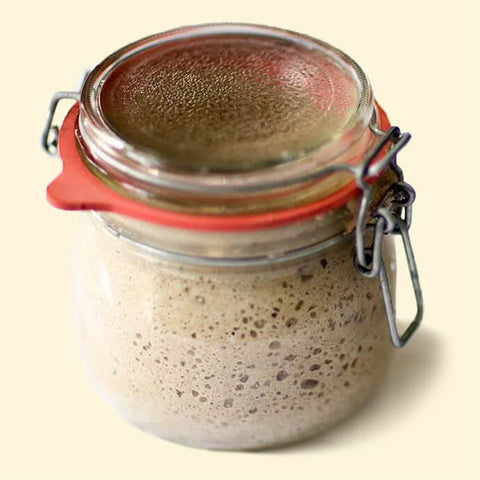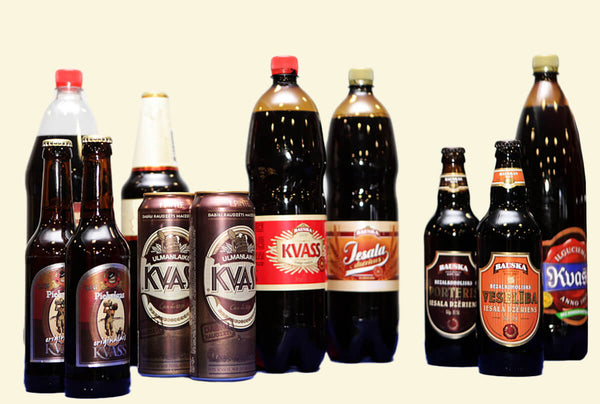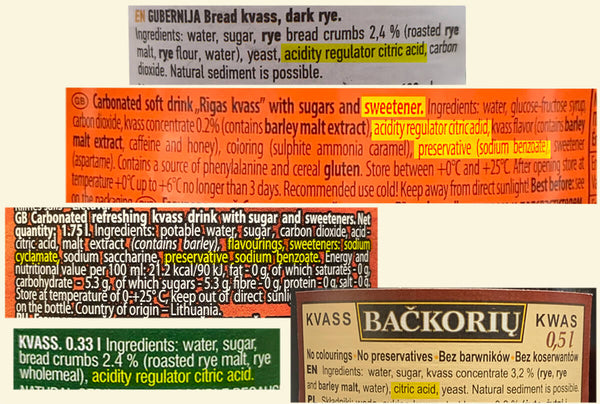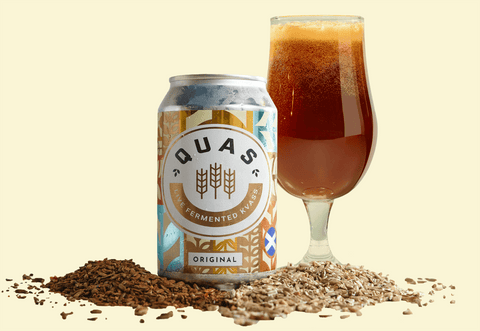No Products in the Cart
Genuine kvass, a 1,000-year-old traditional unfiltered and unpasteurised fermented beverage, is primarily made using rye and barley. This non-alcoholic authentic drink is known for its naturally healthy properties, setting it apart from mass-produced alternatives.
Originating in Eastern European countries, genuine kvass is rapidly gaining popularity in the Western and Asian nations like the United Kingdom, the United States and China. Its unique flavour and nutritional benefits have attracted a loyal following.

Thanks to the fermentation using sourdough starter culture, genuine kvass boasts a rich community of over 100 varieties of beneficial bacteria and yeast. These good microbes contribute to the many health benefits associated with this traditional Slavic and Eastern-European beverage.
Packed with essential vitamins like B1, B3, B2, and B6, genuine kvass also fulfils key requirements for dietary fibres and microelements (zinc and copper) (Ignat et al., 2020).
Moreover, its production process yields a significant number of bioactive molecules and enzymes, also known as "postbiotics", making it a true nutritional powerhouse.
Postbiotics, together with the live bacteria, are responsible for functions that are unique to the benefits attributed to probiotic products (Chung and Kamal-Eldin, 2020):

Commercial kvass found in stores is made by diluting concentrate, adding sugars and acidity regulators, and then artificially carbonating the mixture with carbon dioxide. Surprisingly, fermentation is often absent from the process! Some manufacturers might use baker's yeast for fermentation, but without probiotic bacteria. This yeast is then either filtered out or eliminated during pasteurisation. Since yeast doesn't produce organic acids, manufacturers add acidity regulators and preservatives to achieve the desired taste and shelf life.

Unfortunately, commercial kvass lacks the health benefits associated with traditional kvass. With a high sugar content comparable to a standard can of cola, it's not a healthy alternative. In contrast, genuine kvass typically contains around up to 4 g of sugar per 100 ml. This makes it a healthier option for those seeking natural low-sugar refreshment with no sweeteners.
To identify commercial kvass, check the best-before date on the packaging – it often extends to 12-36 months at room temperature, revealing the difference between this mass-produced beverage and its genuine, traditional counterpart.
| Contains probiotics | Shelf life | Fermentation process | Sugar per 100 mL | Filtered / pasteurised | Storage | |
|---|---|---|---|---|---|---|
| Genuine kvass | ✓ | 4-6 weeks | Sourdough | 3-4g | X | Refrigerated |
| Commercial kvass | X | 12-36 months | Not fermented or Baker’s yeast | 8-12g | ✓ | Room temperature |
Kvass, a traditional fermented beverage, comes in a wide range of flavours and styles. To help you understand the differences, we've compiled a table outlining the key characteristics of various kvass types. Discover the base ingredients, additional ingredients, colours, and flavours of each unique kvass variety.
| Type of kvass | Base ingredient | Additional ingredients | Colour | Flavour |
|---|---|---|---|---|
| Rye bread kvass | Rye bread | Sugar, herbs or fruits | Dark | Sour, malty |
| Wheat/white kvass | White bread | Sugar, herbs or fruits | Light | Mild, sweet |
| Beet kvass | Beets | Salt, sugar, herbs or fruits | Deep red | Earthy, tart |
| Fruit kvass | Various fruits | Sugar, herbs or spices | Varies | Fruity, sweet |
| Honey kvass | Honey | Sugar, herbs or fruits | Light | Sweet, floral |
| Birch sap kvass | Birch sap | Sugar, herbs or fruits | Light | Earthy, woody |
| Herb kvass | Bread | Sugar, herbs or fruits | Light | Herbal, mild |
| Spice kvass | Bread | Sugar, spices, herbs or fruits | Light | Spicy, mild |
To help you explore the fascinating world of fermented beverages, we've compiled a table comparing the key characteristics of kvass, kombucha, and kefir. Learn about the base ingredients, probiotic content, vegan status, origins, tastes, and textures of these popular drinks:
| Base | Probiotic | Vegan | Origin | Taste | Texture | |
|---|---|---|---|---|---|---|
| Kvass | Bread grains | Yes | Yes | Eastern Europe | Sweet and sour | Smooth and refreshing |
| Kombucha | Fermented tea | Yes | Yes | China | Tangy | Viscous and refreshing |
| Kefir | Fermented milk | Yes | No | Russia | Tangy and sour | Creamy and smooth |

Quas sets itself apart from other kvass brands by staying true to the traditional fermentation process. Using a sourdough starter culture, Quas nurtures a thriving community of over 100 types of beneficial bacteria and yeast. Unlike commercial alternatives, Quas is neither filtered nor pasteurised, ensuring that each can contains over 500 billion live bacteria for maximum health benefits.
At Quas, we take pride in avoiding preservatives, acidity regulators, and artificial or natural flavours. All organic acids, vitamins, and enzymes found in Quas are naturally produced by the bacteria present during fermentation. Plus, our kvass contains less than half the sugar of commercial varieties!
We are dedicated to quality and freshness, which is why we produce Quas in small batches on a weekly basis. To maintain its authentic flavour and nutritional value, Quas should always be stored in the refrigerator and consumed within 6 to 8 weeks of delivery.





